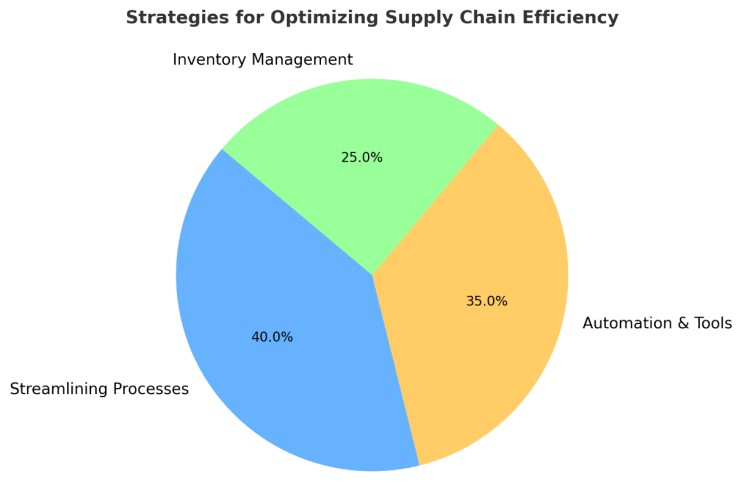
Learning supply chain management tips helps you adapt to changing market demands and also prepare for unexpected challenges. From leveraging technology to adopting sustainable practices, there are many ways to improve your supply chain. These strategies not only reduce risks but also drive long-term growth and customer satisfaction.
A well-managed supply chain supports your business goals and builds trust with partners and customers. By applying the right tips, you can create a resilient and efficient system that adapts to future needs. Taking a proactive approach to supply chain management ensures your operations remain reliable, efficient, and aligned with your goals.
Understanding the Basics of Supply Chain Management
Supply chain management involves coordinating the flow of goods, services, and information from suppliers to customers. It includes key stages such as sourcing raw materials, manufacturing products, managing inventory, and delivering goods to the final destination. Each stage plays a role in maintaining efficiency and meeting customer expectations.
Efficiency in your supply chain is essential for business success. Streamlined processes reduce delays, minimize waste, and lower costs. This can lead to improved profit margins and a more competitive position in the market. An efficient supply chain also enables faster response times to market demands, keeping your business agile and reliable.
Effective supply chain management directly impacts customer satisfaction and costs. Customers expect timely delivery and high-quality products, and a well-managed supply chain helps meet those expectations. By reducing errors and improving consistency, you enhance customer trust and loyalty. Following supply chain management tips can help you refine processes, reduce expenses, and deliver a better overall experience. Managing your supply chain effectively is a critical step toward achieving sustainable business growth.
Strategies for Optimizing Supply Chain Efficiency
Optimizing supply chain efficiency starts with streamlining processes to eliminate bottlenecks and delays. Identify weak points in your operations that slow productivity or waste resources. Simplifying workflows and improving coordination between departments can significantly enhance overall performance. Clear communication and regular process reviews are effective strategies to maintain consistency.
Automation and digital tools provide another way to improve visibility and efficiency. Tools like real-time tracking and inventory management software help you monitor supply chain activities and reduce errors. Automating repetitive tasks not only saves time but also allows your team to focus on strategic decisions. These tools are valuable supply chain management tips for maintaining accurate data and avoiding costly mistakes.
Effective inventory management and demand forecasting are also essential for efficiency. Use data-driven methods to predict customer demand and stock products accordingly. Overstocking ties up capital, while understocking risks losing sales. By leveraging forecasting tools and analyzing trends, you can strike the right balance. Incorporating these supply chain management tips helps create a smoother, more cost-effective operation that supports long-term growth and customer satisfaction.
Building Resilience in Your Supply Chain
Building resilience in your supply chain helps you prepare for disruptions and reduce risks. Start by identifying potential vulnerabilities in your operations. Analyze risks related to natural disasters, supplier failures, or transportation delays. Proactively addressing these risks can minimize their impact on your business.
Diversifying your suppliers is another key strategy for resilience. Relying on a single supplier increases your exposure to disruptions. Working with multiple suppliers spreads your risk and provides alternative options. Building strong relationships with suppliers also improves communication and collaboration during challenging times. These supply chain management tips help ensure your operations remain flexible and dependable.
Contingency plans are essential for navigating unexpected challenges. Develop clear strategies for handling disruptions, such as rerouting shipments or sourcing materials locally. Regularly reviewing and testing these plans ensures they remain effective. With these supply chain management tips, you can maintain stability, adapt to changes, and protect your business from unforeseen events. Resilience in your supply chain strengthens your ability to deliver consistently and meet customer expectations.
Leveraging Technology in Supply Chain Management
Leveraging technology in supply chain management enhances efficiency and accuracy. Tools like artificial intelligence, the Internet of Things, and blockchain bring significant advancements. AI helps optimize routes, forecast demand, and automate repetitive tasks. IoT devices track shipments and also provide real-time updates, reducing the risk of delays. Blockchain adds transparency and security by creating tamper-proof records for every transaction.
Real-time tracking and data analytics are essential tools for modern supply chains. Tracking systems allow you to monitor shipments, inventory, and production status instantly. This visibility improves decision-making and reduces response times during disruptions. Analytics tools turn data into actionable insights, helping you identify patterns and inefficiencies. These supply chain management tips allow you to stay ahead of potential issues and enhance your operational efficiency.
Choosing the right software solutions is critical for meeting your specific needs. Look for platforms that align with your business size, complexity, and industry requirements. Test usability and compatibility to ensure seamless integration with existing systems. These supply chain management tips can guide you in adopting technologies that streamline your processes and drive long-term success. Technology is a key investment for staying competitive and meeting customer expectations.
Sustainability in Supply Chain Management
Sustainability in supply chain management focuses on adopting eco-friendly practices and reducing waste. By optimizing packaging, transportation, and energy usage, you can lower environmental impact while saving costs. Implementing recycling programs and using biodegradable materials are practical steps that contribute to greener operations. These efforts not only benefit the environment but also align with customer expectations for sustainable practices.
Sourcing materials responsibly and ethically is another essential strategy. Choose suppliers who prioritize fair labor practices, environmental stewardship, as well as high-quality materials. Verifying certifications and conducting audits can help confirm ethical sourcing. These supply chain management tips ensure that your business supports global sustainability efforts while maintaining transparency and accountability.
Sustainability enhances your brand reputation and also helps you meet regulatory demands. Many consumers prefer companies committed to ethical and eco-friendly practices, boosting loyalty and trust. Compliance with environmental regulations also reduces risks of fines or legal issues. By integrating these supply chain management tips, you can create a positive impact while strengthening your business’s competitive edge and market appeal.
Measuring and Improving Supply Chain Performance
Measuring supply chain performance begins with tracking key performance indicators (KPIs) that align with your business goals. Common KPIs include order accuracy, on-time delivery, inventory turnover, and transportation costs. These metrics provide insights into efficiency, cost-effectiveness, and customer satisfaction. Monitoring these data points helps you identify trends and areas for improvement.
Regularly evaluating and adjusting your strategies keeps your supply chain agile as well as competitive. Periodic reviews help you adapt to market changes, resolve inefficiencies, and optimize operations. Collaborating with suppliers and partners during these evaluations ensures alignment across all stages of the supply chain. Following these supply chain management tips ensures that your strategies remain effective over time.
Real-world examples demonstrate how improving supply chain performance delivers tangible benefits. For instance, a retail company reduced transportation costs by optimizing delivery routes and consolidating shipments. Another business improved order accuracy by adopting automated inventory management systems. Applying these supply chain management tips can lead to increased profitability, better resource utilization, and also enhanced customer satisfaction. Continuously improving your supply chain is a powerful way to maintain a competitive edge.
Conclusion
Effective supply chain management is essential for maintaining efficiency, reducing costs, and meeting customer expectations. By applying supply chain management tips, you can streamline processes, adopt technology, and build resilience. These strategies help you adapt to challenges and seize opportunities in an ever-changing market.
Regular evaluations and a focus on sustainability strengthen your operations and also improve long-term performance. Tracking key performance indicators ensures your supply chain remains aligned with your goals. These improvements not only enhance your business outcomes but also build trust with customers and partners.
With a commitment to continuous improvement, your supply chain can become a competitive advantage. By using these supply chain management tips, you position your business for growth and long-term success. Making informed adjustments as well as staying adaptable ensures your operations remain efficient, reliable, and sustainable.



